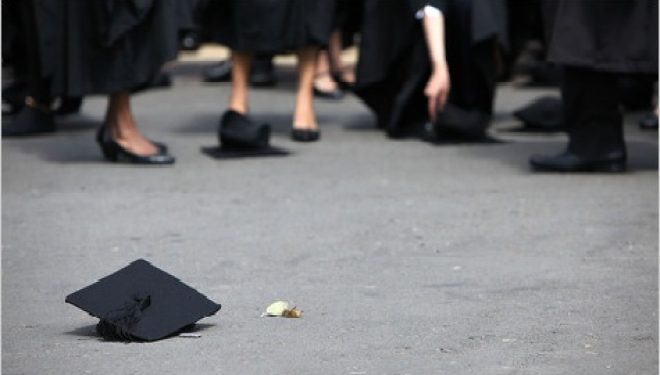
New statistics show that United States military veterans are struggling in college, failing in large numbers, citing post-war stressors such as PTSD and a lack of social support.
Out of an estimated 800,000 veterans enrolled in collegiate institutions, approximately 80% struggle, only to leave after just one year, according to the U.S. Senate Committee on Health, Education and Labor and Pensions.. Only about 3% make it all the way and receive diplomas, notes Newser. Though they excel in life-and-death situations, the high pressures of the classroom are different than ones encountered on the battlefield, with many blaming their poor academic performance on PTSD, cultural divides, and the rigorous intellectual challenges of higher education. “I was the man in the military,” said one retired officer. “Now I’m sitting next to an 18-year-old and I’m struggling to keep up with him in this class.”
A big problem is that most college students came fresh out of high school, while military vets have been removed from a scholastic environment for years. “They are (taking) academically rigorous courses after being removed from the academic setting for so long,” said Michael Dakduk, executive director of Student Veterans of America, a support network for ex-military college students.
“I didn’t know how to study,” said one vet enrolled at Columbus State. “In the military classes (we had taken), they spoon fed you everything because they didn’t want you to fail. It was a struggle going from a structured lifestyle to one where everything is on you.”
Some stresses are triggered unintentionally, notes MSNBC. Exam anxiety, which we’ve all been through, can actually trigger PTSD episodes in veterans. The social situation is tough as well – here you have mature students with a handle on the fragility of life and lethal situations thrown into an environment with restless twentysomethings looking to party. “They really don’t realize how precious life can be, how it can go away in the drop of a dime. They’re more worried about what they’re going to be wearing to school tomorrow, or the spring break that’s coming up. There’s nothing wrong with that. It’s just two different people,” said one vet.
Military vets are also attractive to many institutions since their tuition costs are covered 100% by the fed (as of the post 9/11 G.I. Bill). This actually leads some institutions to act “military friendly” in order to attract G.I. Bill money when in reality, they don’t have many (or any) programs to assist vets in the transition to academia. “There was a concern around certain predatory, for-profit schools using our brand to legitimize their programs,” said the head of the SVA.
The University of Arizona, Syracuse University, Rutgers University, Purdue University, Columbia University and Dartmouth College are supported by the SVA, as they offer well-crafted services that truly help retired military vets thrive in the college classroom.
For more information, visit the Student Veterans of America website.
 Next Article
Next Article






















